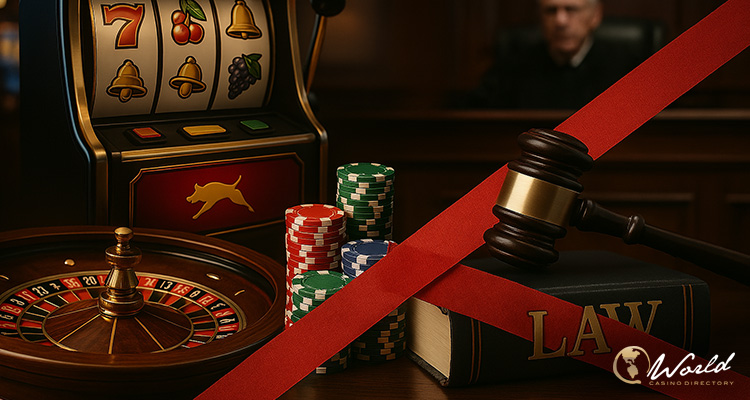A controversial tax amendment tucked into the Senate-passed version of President Donald Trump’s sweeping “One Big Beautiful Bill Act” (OBBBA) is drawing sharp criticism from gamblers, lawmakers, and gaming industry stakeholders. If approved by the House and signed into law, the change could upend the financial viability of professional gambling in the United States.
Under the revised tax code language, gamblers would only be able to deduct 90% of their losses against their winnings starting in 2026. The current law allows players to fully offset their gambling losses, provided they do not exceed their winnings. This alteration may force gamblers to pay taxes even when they break even, or worse, when they lose money overall.
For instance, someone who wins and loses $100,000 in the same tax year would be taxed as though they had made $10,000 in profit, despite netting nothing. The implications are particularly severe for professionals who wager large sums, often with slim margins between wins and losses.
Industry Experts and Players Warn of “Phantom Taxation”
Prominent professional poker player Phil Galfond, known both for his winnings and his advocacy within the gaming world, expressed grave concerns about the amendment in a video posted to X. “Now, we would pay as if we won $5.2 million, minus 90 percent of $5 million, which is $4.5 million for a fake net of $700,000… So you would make $200,000 during the year and pay tax as if you made $700,000,” Galfond explained, highlighting what he called “phantom” earnings that don’t exist in reality.
Galfond emphasized that the new rule wouldn’t just impact high-rollers, according to Newsweek. Casual players and gaming operators would also feel the effects, as professionals play a critical role in sustaining competitive ecosystems across poker, sports betting, and daily fantasy sports.
“This is really bad. Whether you’re a poker player, [Daily fantasy sports] player, a sports better, any kind of gambler – professional or recreational – but especially professional. And even if you are operator in one of these areas. It’s quite scary,” Galfond said.
Lawmakers and Stakeholders Push Back on Tax Provision
Opposition isn’t limited to the gambling community. Democratic Representative Dina Titus of Nevada, a state heavily reliant on the gaming industry, decried the provision. “It pushes people into the black market if they don’t do regulated gaming because they have a tax disadvantage, and the black market doesn’t pay taxes, isn’t regulated, doesn’t help with problem gaming,” Titus warned. “So it’s bad for the industry as well as for the player.”
Titus has pledged to fight the provision, vowing to introduce standalone legislation if the measure isn’t stripped during the House’s final consideration of the bill. She described the addition as “adding insult to injury” for her constituents, noting the broader bill already rolls back healthcare, renewable energy initiatives, and student aid.
Doug Polk, another high-profile poker professional, took his objections directly to Texas Representative Chip Roy. “Chip, I am in your district. There is a provision in the Senate version that will kill professional gambling. This will negatively impact THOUSANDS of Texans,” Polk wrote in a post on X, urging Roy to advocate for the amendment’s removal.
A Crushing Blow for the Gambling Economy?
Maria Konnikova, a poker-playing author, echoed the sentiment. “It’s basically a huge in-built fee on choosing to engage in any form of gambling… Instead of an income stream, poker becomes a liability,” she said. Konnikova noted that even when she nets zero earnings after a year of tournaments, she would now face taxes on $10,000 she never actually earned. “This is absolutely bonkers.”
Professional gamblers, who often operate on thin profit margins over long stretches of volatility, warn that the change could wipe out their entire profession. One anonymous player said that even a $1 million net gain after $99 million in losses could lead to being taxed on an inflated income figure, resulting in a financial loss of $2 million after taxes.
Joshua Horowitz, a CPA who specializes in the professional sports industry, likened the measure to restrictions on business net operating losses, but with more punishing implications for gamblers. “They are limiting your losses to 90%, which may cause people to owe tax even in years that they have net losses,” he said.
According to the Joint Committee on Taxation, the gambling-related provision is projected to generate over $1.1 billion in federal revenue over eight years, approximately $137.5 million per year.
Gambling Industry Faces Uncertain Future as House Considers Final Vote
The Senate narrowly passed the OBBBA by a 51-50 margin on Tuesday, with Vice President JD Vance casting the tie-breaking vote. The House must now vote again on the Senate-amended bill. Its earlier version, approved in May, did not contain the gambling provision. If the current version is passed by the House and signed by President Trump, the changes to gambling loss deductions would take effect in 2026.
Trump has urged Congress to send the legislation to his desk by July 4, but acknowledged on Tuesday that hitting the deadline may prove “very hard.”
With no public explanation as to who advocated for the provision’s inclusion, the gambling community, along with concerned lawmakers, are scrambling to strip it from the final bill before it becomes law.
(Except for the headline, this story has not been edited by PostX News and is published from a syndicated feed.)

